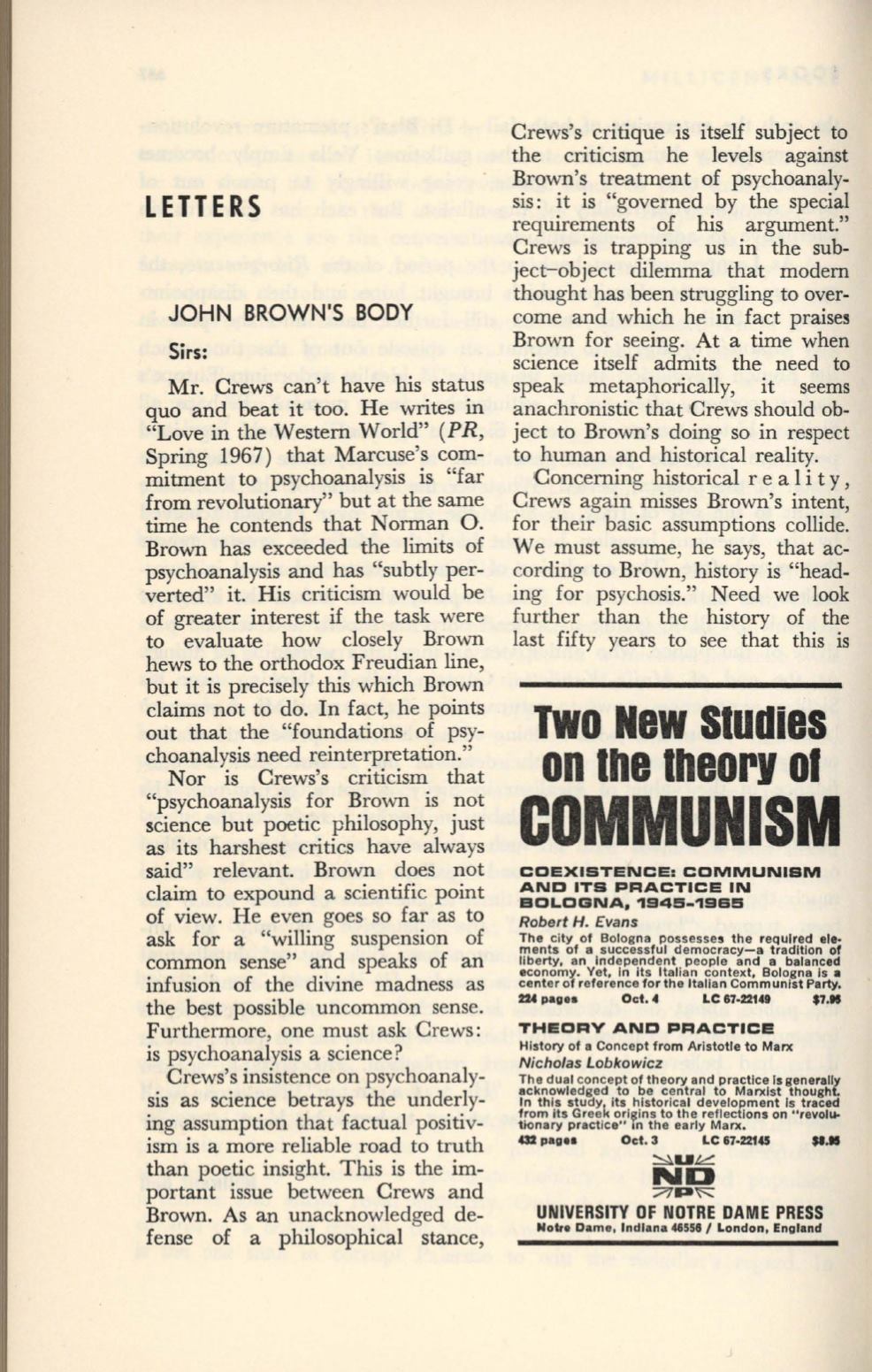
LETTERS
JOHN BROWN'S BODY
Sirs:
Mr. Crews can't have his status
quo and beat it too. He writes in
"Love in the Western World"
(PR,
Spring 1967) that Marcuse's com–
mitment to psychoanalysis is "far
from revolutionary" but at the same
time he contends that Norman O.
Brown has exceeded the
limits
of
psychoanalysis and has "subtly per–
verted" it. His criticism would be
of greater interest if the task were
to evaluate how closely Brown
hews to the orthodox Freudian line,
but it is precisely this which Brown
claims not to do.
In
fact, he points
out that the "foundations of psy–
choanalysis need reinterpretation."
Nor is Crews's criticism that
"psychoanalysis for Brown is not
science but poetic philosophy, just
as its harshest critics have always
said" relevant. Brown does not
claim to expound a scientific point
of view. He even goes so far as to
ask for a "willing suspension of
common sense" and speaks of an
infusion of the divine madness as
the best possible uncommon sense.
Furthermore, one must ask Crews:
is psychoanalysis a science?
Crews's insistence on psychoanaly–
sis as science betrays the underly–
ing assumption that factual positiv–
ism is a more reliable road to truth
than poetic insight. This is the im–
portant issue between Crews and
Brown. As an unacknowledged de–
fense of a philosophical stance,
Crews's.
~r~tique
is itself subject. to
the cntlcism he levels agamst
Brown's treatment of psychoanaly–
sis: it is "governed by the special
requirements of his argument."
Crews is trapping us in the sub–
ject-object dilemma that modern
thought has been struggling to over–
come and which he in fact praises
Brown for seeing. At a time when
science itself admits the need to
speak metaphorically, it seems
anachronistic that Crews should ob–
ject to Brown's doing so in respect
to human and historical reality.
Concerning historical rea 1i t Y,
Crews again misses Brown's intent,
for their basic assumptions collide.
We must assume, he says, that ac–
cording to Brown, history is "head–
ing for psychosis." Need we look
further than the history of the
last fifty years to see that this is
Two New Studies
on the theOry 01
COMMUNISM
COEXISTENCE. COMMUNISM
AND ITS PRACTICE IN
BOLOGNA, 1945-1965
Robert H. Evans
The city of Bologna possesses the required ele–
ments of a successful democracy-a tradition of
liberty, an Independent people and a balanced
economy_ Yet, In its Italian context. Bologna Is •
center of reference for the Italian Communist Party.
22A
pag..
Ocl.
4
LC 67·22149
n...
THEoRV AND PRACTICE
History of a Concept from Aristotle to Marx
Nicholas Lobkowicz
!~:n~~,~~~~~e~~O~~h~~~;a~dt~r~~I~~: ~~~~r:~~
In this study its historical development Is traced
from Its
Greek
ori,ins to the reflections on "revo'""
tk>nary practice"
10
the early Marx.
432
pag..
Ocl.
3
LC 67·22145
$....
~U~
ND
/7P~
UNIVERSITY OF NOTRE DAME PRESS
Notr. Dame, Indiana 46558
I
London, Enaland


